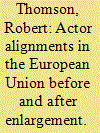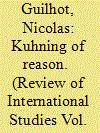| Srl | Item |
| 1 |
ID:
091082


|
|
|
|
|
| Publication |
2009.
|
| Summary/Abstract |
What impact has the 2004 enlargement had on legislative decision making in the European Union (EU)? This study answers this question by examining the controversies raised by a broad selection of legislative proposals from before and after the 2004 enlargement. The analyses focus on the alignments of decision-making actors found on those controversies. Member State representatives, the European Commission and the European Parliament vary considerably in the positions they take on controversial issues before and after enlargement. Consistent patterns in actor alignments are found for only a minority of controversial issues. To the extent that consistent patterns are found, the most common involve differences in the positions of Northern and Southern Member States and old and new Member States. The North-South alignment was more common in the EU-15 and reflected Northern Member States' preference for low levels of regulatory intervention. The new-old alignment that has been evident in the post-2004 EU reflects new Member States' preference for higher levels of financial subsidies. This study argues that the persistent diversity in actor alignments contributes to the EU's capacity to cope with enlargement.
|
|
|
|
|
|
|
|
|
|
|
|
|
|
|
|
| 2 |
ID:
144045


|
|
|
|
|
| Summary/Abstract |
Beyond the initial infatuation with his work, Kuhn’s Structure of Scientific Revolutions has had a lasting impact on the field of International Relations. The article analyses the reception of Kuhn in IR and suggests that it contributed to overcoming the ‘second debate’ by making science and realism fully compatible. More importantly, Kuhn offered a vision of science in which scientific communities operated on the basis of realist principles. This not only consolidated the academic hold of neorealism, but transformed realism into a theory of knowledge, which its critics have failed to acknowledge. This lasting transformation is analysed by looking at Kuhn’s influence on the classic studies of strategic decision-making by Graham Allison and Robert Jervis.
|
|
|
|
|
|
|
|
|
|
|
|
|
|
|
|
| 3 |
ID:
141119


|
|
|
|
|
| Summary/Abstract |
Russia’s war against Ukraine is now well into its second year. The contested area in eastern Ukraine is still marked by regular exchanges of fire, and equally regular losses of life. The United Nations reported in late July 2015 that at least 6,832 people had perished since April 2014, along with over 17,000 wounded. There have been frequent warnings of new Russian offensives, but these have yet to materialise. For all the effort put in by both sides, the basic contours of the conflict have barely changed since September 2014.
|
|
|
|
|
|
|
|
|
|
|
|
|
|
|
|